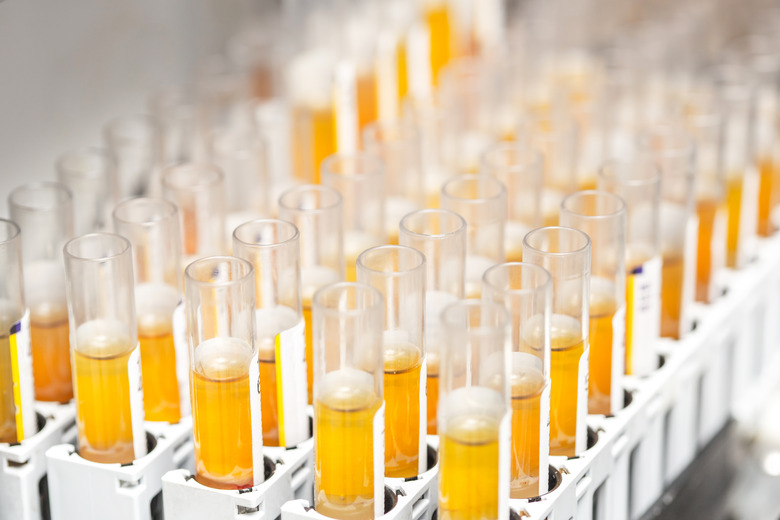What Happens To A Cell If It Does Not Copy DNA Chromosomes Before It Divides?
The growth of all cells is governed by the cell cycle, including cell division. Before a cell can divide, many processes must occur, including the proper duplication of the chromosomes. The cell cycle ensures that all of these processes occur normally, otherwise the cell ceases to progress and could die.
TL;DR (Too Long; Didn't Read)
The cell cycle controls the four major phases of cell growth and division. These phases are the growth phase 1, the synthesis phase, the growth phase 2 and mitosis. The cell's DNA is copied during the synthesis phase. During each step of the cell cycle, there are checkpoints to ensure that the cell is ready to progress to the next phase, regulated by a protein called cyclin. If the cell has not properly copied its chromosomes, an enzyme called cyclin dependent kinase, or CDK, will not activate the cyclin, and the cell cycle will not proceed to the next phase. The cell will undergo cell death. When there are problems or mutations with the cyclin, cell growth proceeds unchecked, and can lead to cancer.
The Cell Cycle
The Cell Cycle
The life of a cell is controlled by the cell cycle, including its division. The cell cycle has four major phases: growth phase 1, synthesis phase, growth phase 2 and mitosis. During growth phase 1, or G1, the cell grows in size in response to certain proteins known as growth factors. A copy of the cell's DNA is made during the synthesis, or S phase. Growth also occurs during the second growth phase, or G2. Mitosis is the phase when the cell actually divides into two cells, known as daughter cells.
DNA Replication
DNA Replication
DNA is copied or replicated during S phase. During this time, the chromosomes are copied, so that there is a complete set of chromosomes for each daughter cell. First, an enzyme called DNA helicase unwinds the two strands of the DNA double helix. Then another enzyme, DNA polymerase, binds to the DNA strands and causes complementary nucleotides to bind to each of the strands. Finally, another enzyme, DNA ligase, binds the newly formed, complementary strands to the existing strands.
Checkpoints in the Cell Cycle
Checkpoints in the Cell Cycle
At each step of the cell cycle, there are checkpoints to ensure that the cell is ready to progress to the next phase. These checkpoints are regulated by a group of proteins known as cyclins. There are different types of cyclins to regulate the different phases of the cell cycle. S phase cyclins regulate progression through the cell cycle during DNA replication. An enzyme known as cyclin dependent kinase, or CDK, activates the cyclins. If a cell has not properly copied its chromosomes or there is damage to the DNA, the CDK will not activate the S phase cyclin and the cell will not progress to the G2 phase. The cell will remain in S phase until the chromosomes are properly copied, or the cell will undergo programmed cell death.
The Cell Cycle and Cancer
The Cell Cycle and Cancer
Proper regulation of the cell cycle is very important to ensure normal cell growth. If a cell continues through the cell cycle, even though it has not met the appropriate checkpoints, it can continue to grow uncontrolled. This can eventually lead to tumor formation and cancer. In fact, many cancers are caused by mutations in the cyclin proteins, which allow cells to bypass the proper checkpoints and continue to grow.
Cite This Article
MLA
Thompson, Noelle. "What Happens To A Cell If It Does Not Copy DNA Chromosomes Before It Divides?" sciencing.com, https://www.sciencing.com/happens-cell-not-copy-dna-chromosomes-before-divides-3340/. 24 April 2018.
APA
Thompson, Noelle. (2018, April 24). What Happens To A Cell If It Does Not Copy DNA Chromosomes Before It Divides?. sciencing.com. Retrieved from https://www.sciencing.com/happens-cell-not-copy-dna-chromosomes-before-divides-3340/
Chicago
Thompson, Noelle. What Happens To A Cell If It Does Not Copy DNA Chromosomes Before It Divides? last modified March 24, 2022. https://www.sciencing.com/happens-cell-not-copy-dna-chromosomes-before-divides-3340/
